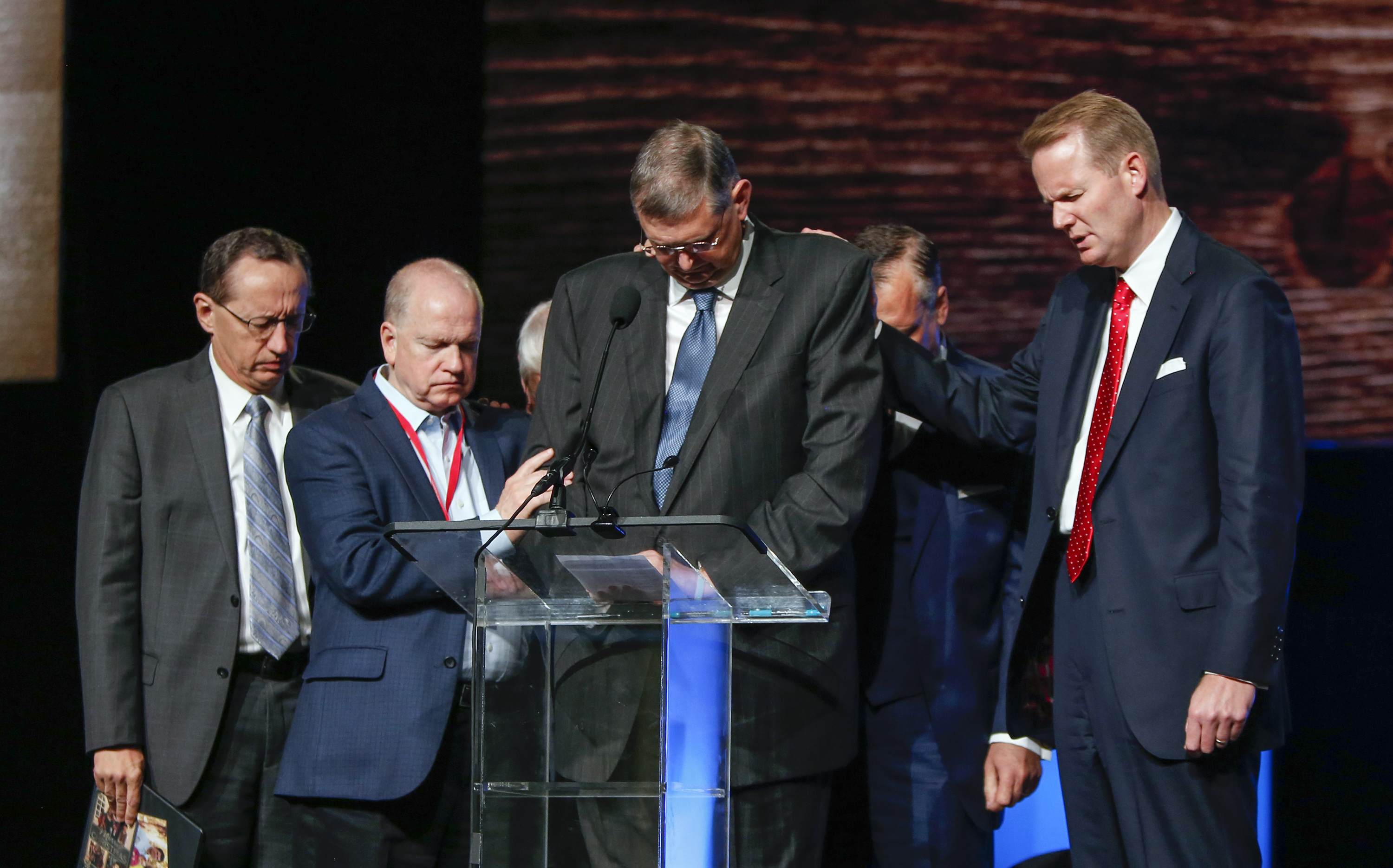
[SLIDESHOW=48263]DALLAS (BP) — Presidents of the Southern Baptist Convention’s six seminaries reported on their 2017-2018 academic year to messengers June 13 at the SBC annual meeting in Dallas.
Iorg reports Gateway Seminary ‘at its best’
By Kathie Chute
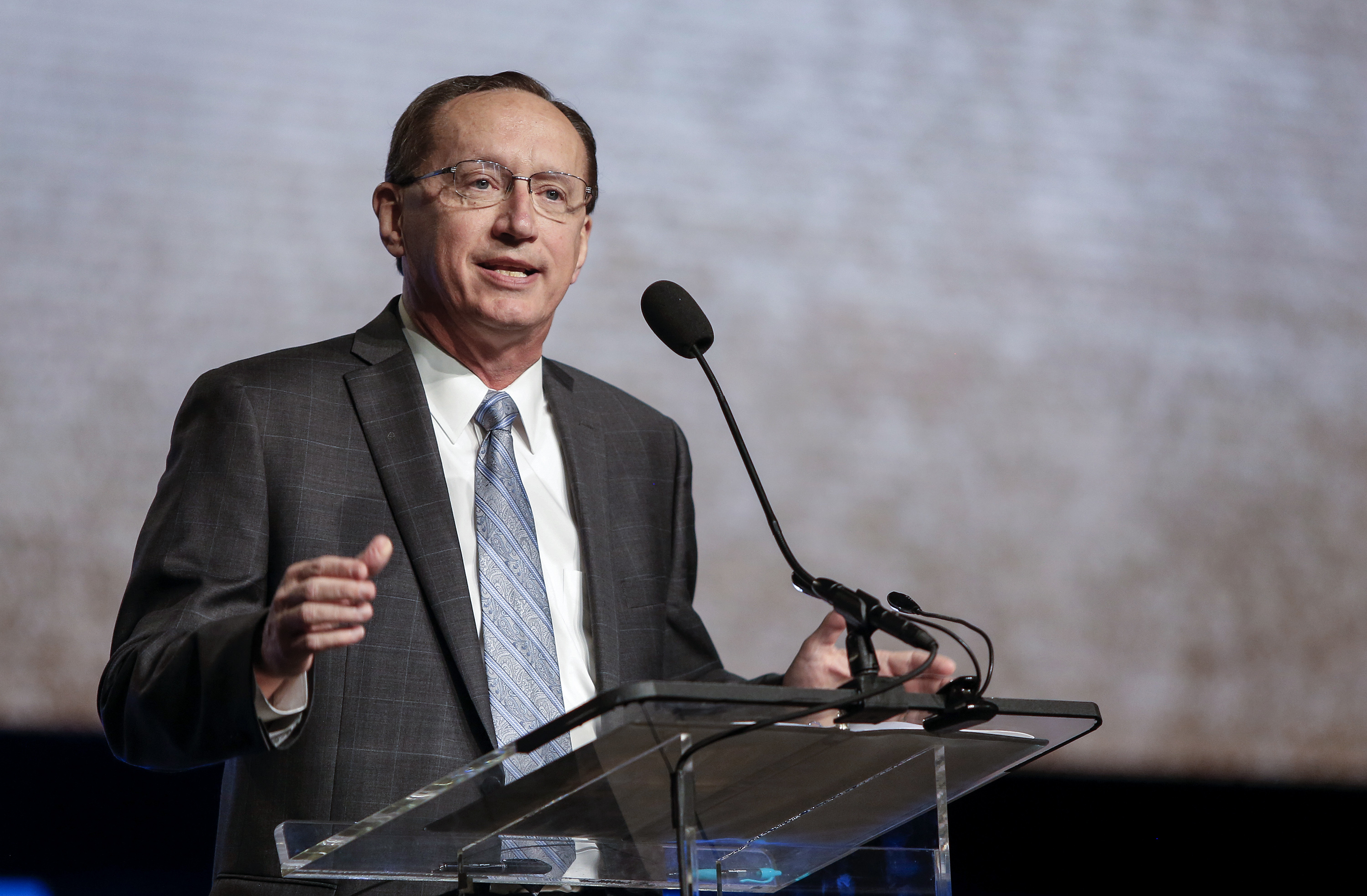 DALLAS (BP) — Jeff Iorg, president of Gateway Seminary, reminded messengers that his past several reports have dealt with transition, moving the campus and a name change.
DALLAS (BP) — Jeff Iorg, president of Gateway Seminary, reminded messengers that his past several reports have dealt with transition, moving the campus and a name change.
“That is behind us now,” Iorg said. “I am pleased that today my report is about Gateway Seminary at its best.”
Iorg reported that Gateway students and faculty recently traveled to a remote Southeast Asia country in cooperation with the International Mission Board to ask two questions of those in that area: Does anyone here know the man named Jesus and does anyone here know someone who is a Christian?
“In one area, the answers to both questions were ‘no,’ so they checked into a local motel. The next morning, one of the students was outside singing, and the woman who ran the hotel came to her and asked if she was singing folk music. The student said no, she was singing a song to praise God. The woman accepted Jesus Christ as her Lord and Savior, the first person in that region to do so.”
Gateway students studying in both online and traditional formats have shared the Gospel 429 times in shelters, on the streets, in malls, to friends and to people they have never met during the past year, Iorg reported.
“Ninety-eight people prayed with our students to receive Christ as Lord,” he said. “One student was so inspired that he expanded efforts to the children in his church. In all, more than 100 people came to Christ through evangelistic training in our classes. These stories show Gateway Seminary at its best.”
Iorg said faculty and staff, in moving to Southern California with the seminary’s transition in 2016, bought houses in neighborhoods with no churches at all.
“Some of these people pooled their resources to start churches instead of driving a distance to find a church. Gateway Seminary is taking the Gospel to places it has never been heard, expanded the Gospel and started churches.”
Despite the relocation, Gateway’s enrollment has remained steady at about 2,000, Iorg said. The seminary has graduated 600 students in the past two years [since relocating] and received two special donor gifts.
“No one on Gateway Seminary’s staff requested these gifts,” he said. “Instead friends of the seminary asked friends to give. Those two gifts totaled more than $1 million.”
Iorg also told messengers that the seminary has offered classes since 1962 on the Southern California campus located in Brea, Calif., but with the main campus in Ontario, Calif., the campus in Brea was no longer needed. The sale of that property will allow the seminary’s endowment to increase from $16 million to $60 million.
“We are the leading institution modeling multicultural ministry,” he said. “For two decades, Anglos have been in the minority on our campus. Sixty percent come from the countries of the world, and more than 30 percent of our students are women.”
Iorg answered questions from messengers about how Gateway was navigating the balance between online and traditional education, what steps were being taken to equip the faculty to better handle physical abuse cases and what the seminary was doing in restitution of the cases involved.
“We keep meticulous records gauging progress between online and traditional classes,” he said. “Our online classes are not simply glorified correspondence courses but educational experiences similar to those in the traditional classroom. We find that there is little difference between the two.”
In his 14 years as Gateway president, Iorg said, a serious allegation of abuse has never been made among students, faculty or staff.
“We do have clear policies in place at Gateway. In California, we are mandated to do sexual harassment training, and we follow that mandate as well.”
Iorg thanked Southern Baptists for its support of Gateway Seminary and asked for prayer.
“Thank you for your gifts and for sending us your students. I appeal to you today to put Gateway on your frequent prayer list. In California and in the West, we face constant pressure every day for our stance on biblical marriage and other issues.”
**********
Allen notes Midwestern’s ‘profound stewardship’ to SBC
By T. Patrick Hudson
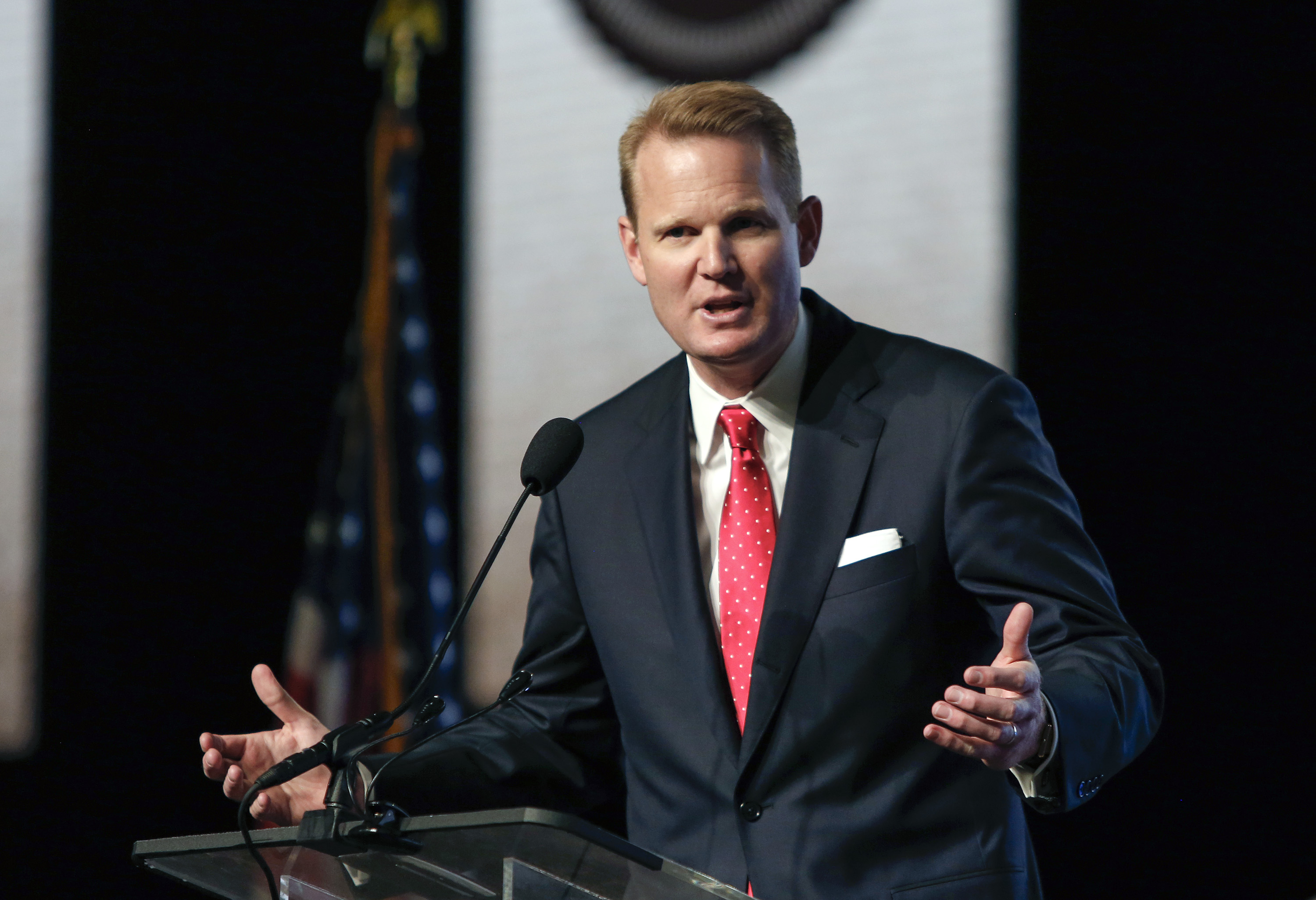 DALLAS (BP) — Midwestern Baptist Theological Seminary President Jason Allen’s report to messengers at the 2018 Southern Baptist Convention annual meeting reflected a focus on stewardship.
DALLAS (BP) — Midwestern Baptist Theological Seminary President Jason Allen’s report to messengers at the 2018 Southern Baptist Convention annual meeting reflected a focus on stewardship.
The many signs of favor God has poured onto Midwestern during his nearly six-year tenure are not taken for granted by him or the seminary’s leadership team, Allen said.
Like the apostle Paul’s urging for Timothy to “guard what has been entrusted to him,” Allen said Midwestern’s leadership team carries a profound stewardship on behalf of the 47,000-plus churches who come together to support theological education.
“Over the past five years, God has been pleased to bless this institution in remarkable ways, and I am proud of that — not merely because of the strength it has enabled us to demonstrate but because of what that communicates about the men and women sitting before me and scattered throughout and around our denomination,” Allen said.
“Students who come and donors who give represent a denomination that believes wholeheartedly in our work, the strength of our faculty, the integrity of our vision, the clarity of our mission, and that we are committed, indeed, to serving the local church.”
Allen added that Midwestern’s unchanging vision, reflecting this stewardship, is to exist “For the Church.”
“Our ambition is to be the premier institution in North America training ministers, pastors and evangelists for local church service, not just in a generic sense, but particularly for Southern Baptist churches,” Allen said. “That has propelled us forward in a whole host of different ways, and this past year was another of unprecedented institutional achievement.”
Among the achievements for which he is thankful, Allen noted record enrollment, significant progress on campus construction projects, hiring a highly-respected faculty member, and the recent announcement about changes to the school’s undergraduate program.
Regarding enrollment, Allen expressed gratitude to God for continued growth, with Midwestern surpassing 3,400 students this academic year, which means enrollment over the past six years has tripled. Additionally, all early metrics portend another record enrollment this fall.
Allen said construction of the 40,000-square-foot Mathena Student Center –that will include a cafeteria, gymnasium, workout space, bookstore, café and seminar space — is approaching completion. The facility will be in use by the beginning of the fall semester, and thanks to the generosity of the Mathena family of Oklahoma City and many others, the construction will be accomplished with no long-term debt.
Another construction project — renovating the existing classroom and faculty building –is only weeks away from completion as well. The results of these undertakings, Allen said, will position the seminary’s infrastructure well into the 21st century.
Allen also reported the hiring of Andreas Köstenberger as research professor of New Testament and biblical theology and as director of a forthcoming Center for Biblical Studies. Allen praised Köstenberger as “one of the elite New Testament scholars in the evangelical world,” and added, “He comes in and complements and strengthens our biblical studies department.”
Finally, Allen shared with messengers a plan over the past year and a half to unveil changes in how Midwestern’s undergraduate program could better serve the churches of the SBC. Renaming the school’s undergraduate arm as Spurgeon College, the ideology was to emulate the famed British preacher C.H. Spurgeon.
“As you know,” Allen said, “we own the Spurgeon Library; we house the Spurgeon Library; and moreover we share Spurgeon’s convictions and ambitions for ministry” — his steadfast commitment to the Word of God and the Gospel of the Lord Jesus Christ; his willingness to defend the faith; and his determination to impact society through a host of social ministries.
“So for us, it is natural, fitting and right to launch Spurgeon College to help us extend our mission of training undergraduate students … who need that preparation,” Allen said. “We are proud to stand in the gap for you and to serve you through Spurgeon College.”
Concluding his report, Allen said, “‘For the Church’: that is why we exist. This is a perennial vision and we will not unveil a new one next year or the year after. That is who we are, and for me the great delight is to see how that vision has migrated from being ‘my’ vision for the seminary to ‘our’ vision for the seminary to ‘the’ vision for the seminary.
“We exist for the church; we exist for your church; and we are doing that as faithfully was we can by God’s grace, and we are thrilled with results God has given us.”
**********
Kelley: NOBTS living out Great Commission 100 years
By Marilyn Stewart
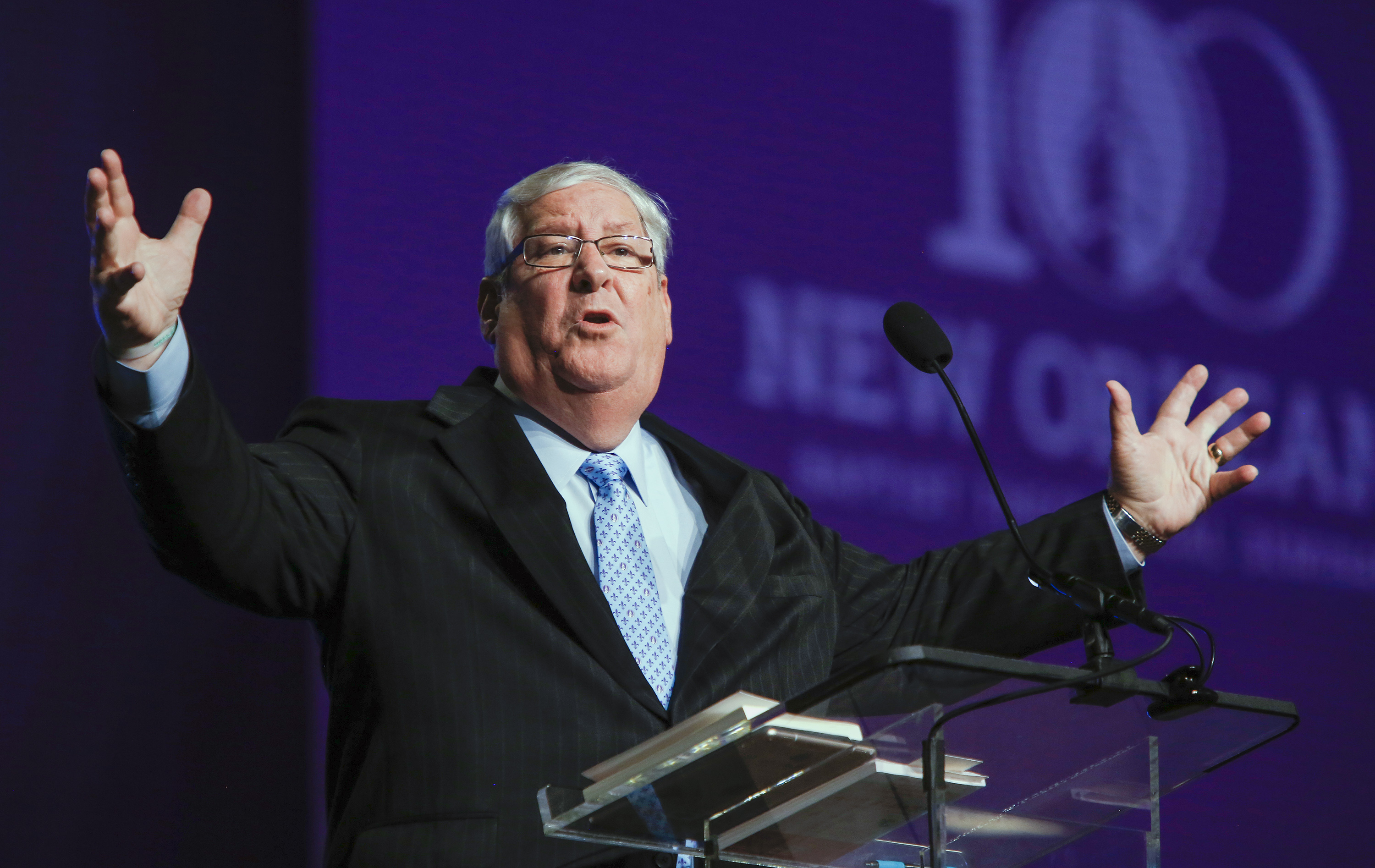 DALLAS (BP) — The founding of New Orleans Baptist Theological Seminary was the “most radical decision” ever made by Southern Baptists, President Chuck Kelley told messengers in his report to the convention June 13.
DALLAS (BP) — The founding of New Orleans Baptist Theological Seminary was the “most radical decision” ever made by Southern Baptists, President Chuck Kelley told messengers in his report to the convention June 13.
Placing an entity in a city without church and denominational support was “the radical part,” Kelley said, noting that New Orleans had less than 10 Southern Baptist churches at the time, with the seminary intended as a “mission project.”
“For 100 years, we have been in that most ‘un-Baptist’ of places,” Kelley said. “Through the years we have been faithful in understanding that we are not simply a seminary preparing people for ministry, we are evangelists and church planters reaching the city for Christ.”
Kelley said the seminary has remained true to its original motto of “Learning to do and doing to learn.”
Today, more than 130 Southern Baptist churches exist in the New Orleans area with many churches in southern Louisiana and Mississippi owing their founding to NOBTS faculty, staff and students, Kelley noted, adding that currently 39 NOBTS students are serving as North American Mission Board church planters in the city.
“We are in a place where the Great Commission is not the subject of a conversation, it’s not the slogan we write on the wall, it is the reality we face every day,” Kelley said. “And we love it.”
Reaching outside seminary walls with the Gospel is the reason NOBTS is committed to making theological education available and accessible, Kelley said.
NOBTS makes distance learning available through extension centers, workshops and event courses, and internet-accessed programs such as NOLA2U, a synchronous online delivery system providing students the full classroom experience from their home computers.
“We are committed to providing theological education to everyone who is answering God’s call,” Kelley said. While the quality of education is a priority, Kelley said “access is the key.”
Diversity is a commitment at NOBTS, Kelley continued, citing the more than $800,000 distributed to African American students through the Fred Luter Jr. scholarship program over the last five years as well as multi-facted opportunities for women students and the impact of the NOBTS women’s ministry program. Kelley added that women occupy the NOBTS associate dean of graduate studies and associate dean of NOBTS/Leavell College positions.
Kelley noted the seminary’s focus on evangelism through the NOBTS Caskey Center where student scholarship recipients are required to share the Gospel weekly. Sometimes, students worry they will not have opportunities to share, Kelley said.
“What they discover is that when they begin to pray, the opportunities are there,” Kelley said.
Students are taught to pray the “Monday morning prayer,” asking God to send an opportunity that week for a Gospel conversation, Kelley said, reporting more than 8,300 Gospel conversations last year, with 1,100 coming to faith in Christ.
Kelley challenged messengers to heed the lesson learned by NOBTS students and pray for Gospel conversation opportunities.
“God will give us opportunities to lift high the cross of Jesus Christ if we will but ask for them and look for them,” Kelley said. “It does not matter how much you share the Gospel inside the church, by far the largest number of people who need the Gospel are outside the church.”
Kelley also reported on the impact of the NOBTS baccalaureate and certificate programs conducted in five maximum security prisons in four states, including at Louisiana State Penitentiary in Angola, once known as the “bloodiest prison in the nation.”
“The culture of that prison changed as the Gospel got loose inside that prison,” Kelley said. “That prison has been transformed by the power of Jesus Christ.”
Kelley thanked Southern Baptists for their continued and faithful support of the seminary throughout its 100-year history.
“None of this happens without the Cooperative Program and for gifts above and beyond the Cooperative Program from those who think training ministers and missionaries is important,” Kelley concluded. “We are profoundly grateful to you.”
**********
Akin: God’s grace ‘more than sufficient’ for SEBTS
By Lauren Pratt
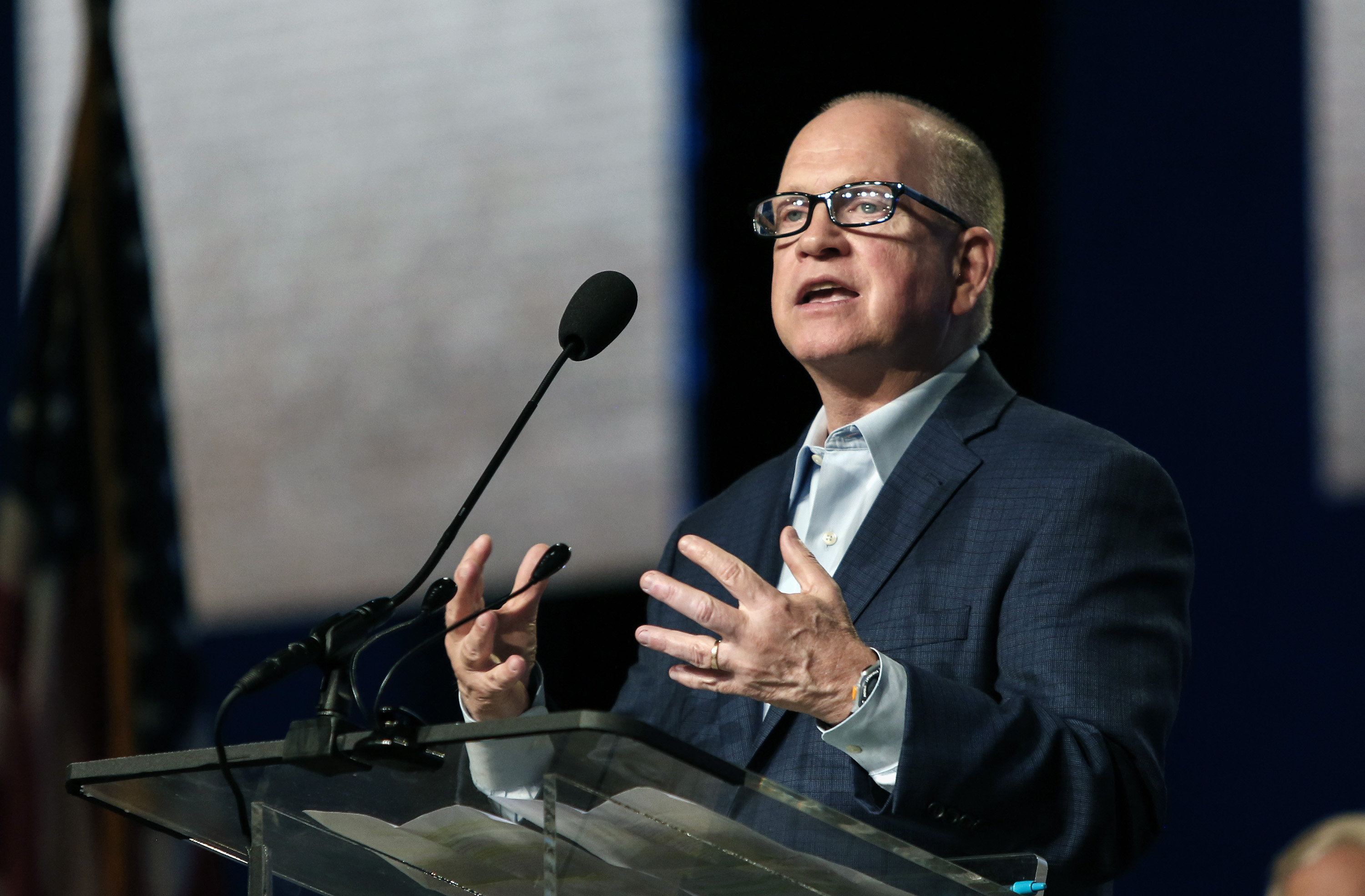 DALLAS (BP) — Danny Akin, president of Southeastern Baptist Theological Seminary, reported to messengers at the Southern Baptist Convention in Dallas June 13.
DALLAS (BP) — Danny Akin, president of Southeastern Baptist Theological Seminary, reported to messengers at the Southern Baptist Convention in Dallas June 13.
In light of recent allegations, which involved the mishandling of an alleged rape report at SEBTS during Paige Patterson’s presidency in 2003, Akin recounted, “We have faced some challenging times, but God’s grace has been more than sufficient.”
Along with the tumultuous events that have confronted the SBC for weeks, Akin spoke candidly of the place and care women have at SEBTS.
“Southeastern is absolutely committed to providing the safest environment for all of our students but especially our women,” he said.
Akin noted the many successes Southeastern has seen in the past year, including the increase in its minority and female student population on campus through its Kingdom Diversity Initiative led by Walter Strickland, associate vice president for diversity and instructor of theology. Through KDI’s implementation in 2013, the seminary has increased its non-white student population by 53 percent and its female student population by 37 percent. More specifically, the non-white and female student population at SEBTS stands at 16.83 percent and 32.74 percent, respectively.
“We are absolutely committed that the church on earth is going to look like the church in heaven,” Akin said.
Akin also celebrated the fact that Southeastern exceeded 4,000 students enrolled at the seminary during the 2017-2018 school year and currently has a 4,155 campus and online student population.
The Great Commission “is not just a theme; it’s something we live out,” Akin said, noting that at Southeastern every classroom is considered a Great Commission classroom where students learn and live out the mission of God.
Regarding The College at Southeastern, Akin spoke of its growth and development through the continuation of its residence life House System for college students and the History of Ideas curriculum in which college students study a variety of historical authors, both secular and Christian.
Other developments at SEBTS over the past year include the North Carolina Field Minister Program, which began in August 2017 to train men in the Nash Correctional Institution in Nashville, N.C., as ministers in the context of the prison system. SEBTS welcomed 29 students to the program in August to begin their training through The College at Southeastern in partnership with the North Carolina Department of Public Safety and Game Plan for Life led by Joe Gibbs.
Southeastern’s Global Theological Initiatives is continuing to develop with the addition of its Asian Leadership Development office. Meanwhile, 18 students from Santo Domingo, Dominican Republic, graduated with a master of arts in Christian studies along with 24 students from Oaxaca, Mexico, who graduated with a master of arts in theological studies. Many of these graduates are professors and convention leaders in their respective countries.
“It is our calling to equip every student to serve the church and fulfill the Great Commission, Akin said. “By His grace and for His glory, we want to do this until King Jesus returns.”
**********
Mohler at 25 yrs.: ‘revival beyond anything we could have imagined’
By SBTS Communications Staff
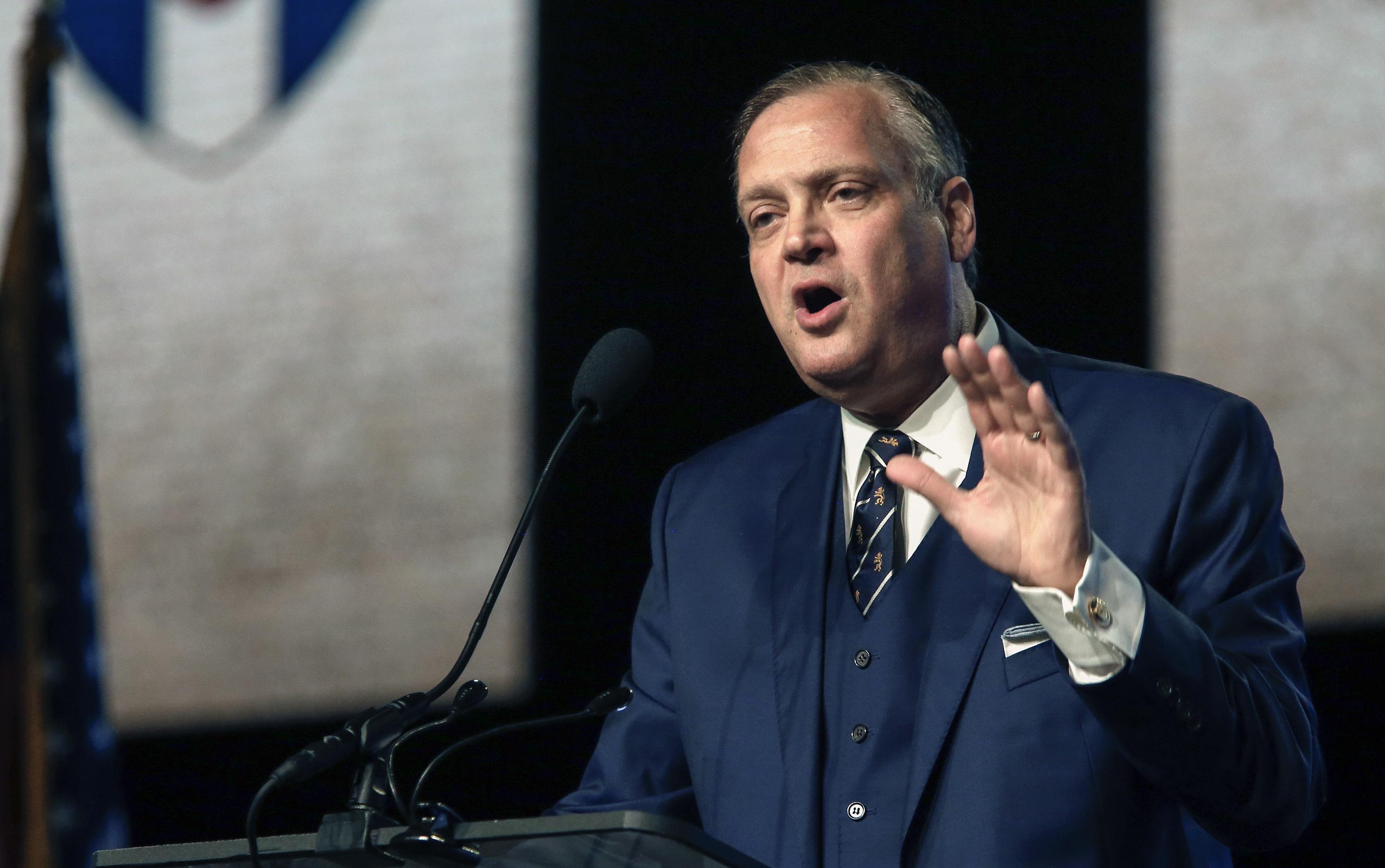 DALLAS (BP) — During his report on behalf of Southern Baptist Theological Seminary, R. Albert Mohler Jr. surveyed the seminary’s growth during his 25 years as president.
DALLAS (BP) — During his report on behalf of Southern Baptist Theological Seminary, R. Albert Mohler Jr. surveyed the seminary’s growth during his 25 years as president.
He began by alluding to the doctrinal controversy at the seminary — and the entire convention — in the late 20th century, which surrounded the authority of the Bible and the place of the school’s confession, the Abstract of Principles, in its operations.
“Twenty-five years ago, we were told that if you took a seminary and unquestionably returned it to confessional integrity, if you required that the seminary would teach and would stand for the complete trustworthiness of God’s Word, if you would require the inerrancy of Scripture as its affirmation and the eagerness of its teaching … you would have no friends,” Mohler said.
“To the glory of God, 25 years later, The Southern Baptist Theological Seminary is now the largest ATS-accredited seminary in the world,” Mohler said. “The Lord blessed the reformation and recovery and gave revival beyond anything we could have imagined.”
Southern Seminary now has more than 2,200 students enrolled in its master of divinity degree program, Mohler reported, which the school’s leadership estimates to be the largest collection of M.Div. students at one school in the history of theological education. The seminary also reports nearly 5,500 in total student headcount. Mohler also said he recently awarded the 11,000th diploma of his tenure as president.
Mohler told the convention that Southern Seminary “graduates serve in virtually every populated continent on earth.”
He talked about the founding of the Billy Graham School of Missions, Evangelism and Ministry in 1993 and the late evangelist’s contribution to the recovering of the seminary; the expansion of the Southern’s online programs and its undergraduate school, Boyce College, during the past 25 years; and the seminary’s ongoing emphasis on residential theological education, explaining that on-campus quality forms a foundation for other efforts.
“We are absolutely committed to the gold standard of residential theological education on the campus,” Mohler said. “We believe that building the faculty and b`uilding the program there at 2825 Lexington Road makes possible everything else we do beyond that.”
Mohler also expressed gratitude to the messengers of the Southern Baptist Convention for the stewardship and resources it places in the seminary. He made clear that the work that has gone into his 25 years as president does not indicate that he plans to slow down.
“I come to give you this report at the conclusion of my 25th year, with my commitment never more vibrant than it is now.”
From the convention floor, Mohler was asked about women teaching the Bible, specifically whether the men that the late missionary Joanna Moore lead away from darkness in black communities in the South should be discounted because of her gender.
Addressing the broader question, Mohler said every professor in Southern Seminary’s school of theology must be qualified to be a pastor of a Southern Baptist church.
“That means that every faculty member in the school of theology and every faculty position is going to be filled by a man,” he said. “And we say that without an apology.
“But at the same time, we have other schools and other programs in which there are many women who are on the faculty and wonderfully serving.”
Mohler said he thinks that distinction is “really important,” and he added that “there is not a man in this room who is not indebted to women who have taught him.”
**********
‘Southwestern moves forward,’ interim president tells SBC
By Alex Sibley
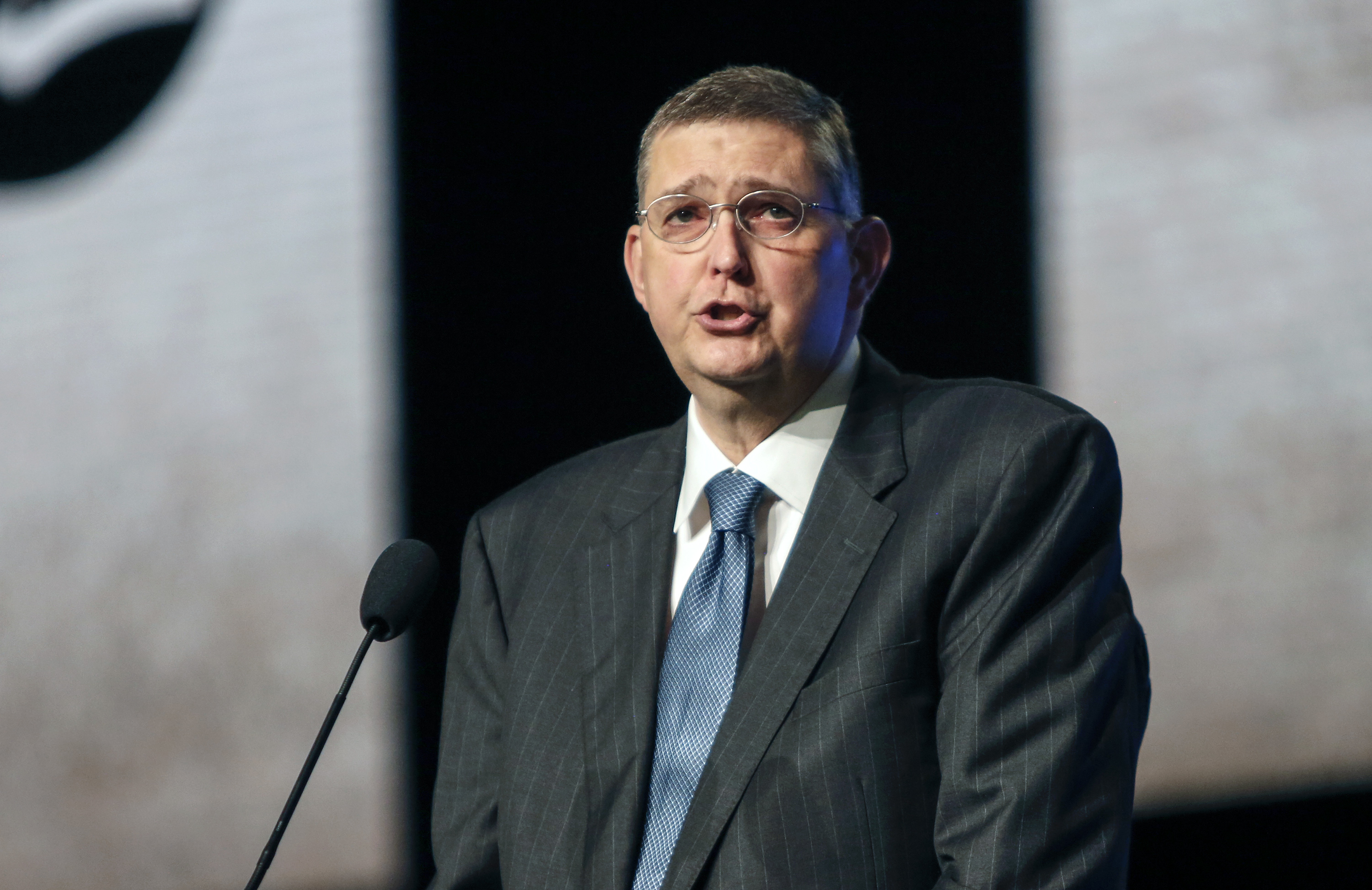 DALLAS (BP) — D. Jeffrey Bingham, interim president of Southwestern Baptist Theological Seminary, began his report to the Southern Baptist Convention with an acknowledgement that, though he came to talk about the future of Southwestern, “as a Baptist and as a Christian, I cannot speak to you about the future of the seminary without reflecting responsibly upon its past and what our intentions are in relationship to the past.”
DALLAS (BP) — D. Jeffrey Bingham, interim president of Southwestern Baptist Theological Seminary, began his report to the Southern Baptist Convention with an acknowledgement that, though he came to talk about the future of Southwestern, “as a Baptist and as a Christian, I cannot speak to you about the future of the seminary without reflecting responsibly upon its past and what our intentions are in relationship to the past.”
“Let me state without any lack of clarity: My intention, my priority, is to create a safe environment and a campus culture that protects and cares for the victims of abuse,” Bingham said, though making no direct reference to former SWBTS President Paige Patterson’s termination in part over the handling of a student’s sexual abuse report involving another student.
“At Southwestern, we denounce all forms of abuse, all behavior that enables abuse, all behavior that fails to protect the abused, and all behavior that fails to protect those who are vulnerable to abuse. We pray for the abused, and we agonize for them.”
Bingham said he has instructed Southwestern faculty and staff to retake and complete a course in sexual harassment by July 31. Furthermore, seminary leadership is meeting with third-party agencies and ministries “that will help us to move forward in the ways in which we need to move forward in recognizing conditions that contribute to abuse and helping us to grow in our manner of how we respond to allegations of abuse and how we shall care for the abused.”
While such matters are his priority, Bingham declared that some things “have not changed and will not change” at Southwestern.
“By the grace of God and by His might, [the seminary] has weathered world wars, financial recessions and eight presidential transitions,” Bingham said. “We have not moved physically, and I guarantee you we have not and will not move doctrinally.
“Our board of trustees, our faculty and our administration are completely committed with integrity to the inspiration of Holy Scripture, to the inerrancy of Holy Scripture and to the identity of Holy Scripture as the authority for our rule of faith and practice.”
Bingham assured messengers that Southwestern remains committed to world evangelization, to personal evangelism and discipleship, to the teaching and mentoring of students, and to the entire Baptist Faith and Message. He noted Southwestern students’ recent involvement with Crossover and with international mission trips throughout the summer.
Bingham also noted that Southwestern is a “welcoming campus,” highlighting the diversity of the student body.
“In Revelation 7, you will find the apostle John receiving a vision of women and men from every nation, every ethnicity, every language gathering before the Lamb of God to worship and adore Him, and it is in that vision that we find our model at Southwestern for our student body,” Bingham said. “Currently, we have students that represent 46 of the 50 United States and 45 different countries.”
Additionally, Bingham said Southwestern welcomes “the diversity and the breadth that exists within our Southern Baptist churches, and within evangelicalism at large.” He added, “We refuse to be a seminary that defines itself in opposition to this difference or to that difference within the SBC.”
Bingham concluded his report with the affirmation that, though “our struggle is not against flesh and blood, but against the spiritual forces of darkness in the heavenly places,” the Lord Jesus Christ is exalted above every principality as He sits at the right hand of the Father. Furthermore, Bingham said, the Holy Spirit dwells within every believer, and one day, Jesus will return, and the Kingdom of God “will be ours to enjoy.”
“And so Southwestern moves forward,” Bingham said, “with the Son of God above us, with the Spirit of God within us, and with the Kingdom of God before us.”
